Learning from people
Posted: - Modified: | connecting, learningI have a friend who's focusing on learning how to ask better questions. Actually, he realized his goal is probably to ask more questions in the first place, since even simple questions ("Where did you come from?") can lead to interesting stories.
It got me curious about getting better at learning from people. I think this will help me learn about the stuff that I can't find in books because:
- New things often aren't in books
- There's a lot of tacit knowledge that's difficult to capture
- Sometimes I don't understand something well enough to research it
- Talking to people can help me come across things I didn't know to ask about
I think getting better at asking questions and learning from people involves figuring out:
- what to ask about (spotting opportunities or following curiosities)
- who to ask
- how to build rapport
- how to pick the right time/place/sequence
- how to frame the question (level of detail, phrasing, etc.)
- how to follow up
So that gives me specific things to focus on in terms of learning from others and trying things out myself.
I've been thinking about two aspects of learning from people: working with mentors/coaches/trainers, and having casual conversations with other people.
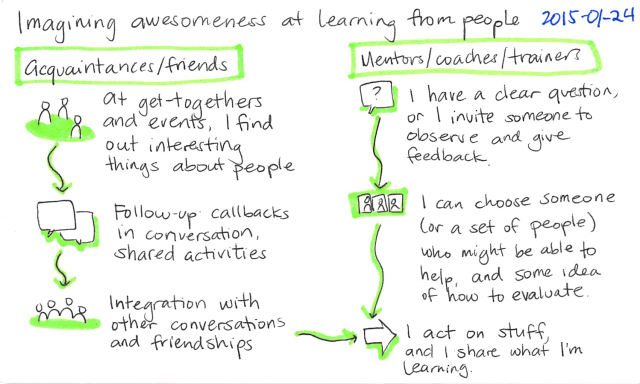
Mentors/coaches/trainers
I've been lucky to have many mentors (both formal and informal) who helped me learn how to navigate organizations, find opportunities, build skills, and so on. But I haven't been as deliberate about learning as I could have been. I periodically consider finding a coach for my writing or coding, but haven't taken the leap.
I've heard from people who weren't sure if therapy was working out for them; they couldn't evaluate their progress. I think I'm hesitant for similar reasons. I'm uncertain about choosing candidates, asking useful questions, evaluating the results, and balancing the value and the opportunity cost.
This is precisely the sort of situation for which an opportunity fund is useful, because it pushes me to Just Try Things Out. I'm slowly warming up to that idea, hence all the blog posts thinking out loud.
Here are some areas I'm considering:
- How can I think in larger chunks?
- How can I write more useful posts?
- How can I make my thinking-out-loud posts more useful?
- How can I improve my Emacs habits/workflow?
- How can I share more Emacs tips, and how can I do that more effectively?
- How can I draw with more colour and style?
For example, an editing experiment might help me develop a better mental model of an editor, forcing me to search for more specific vocubulary (down with "stuff"!), testing to see if something I've written makes sense, and checking for gaps.
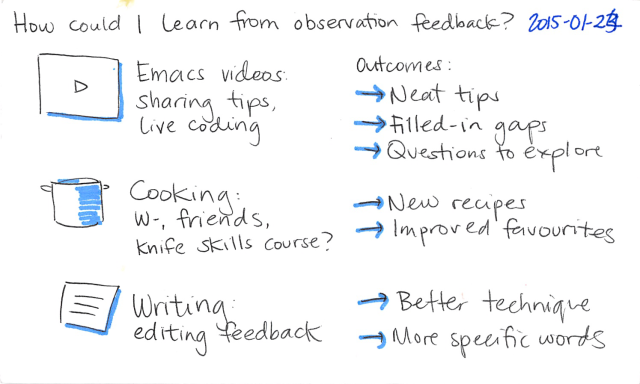
In addition to directly asking for specific help, I might learn a lot from general observation. A friend suggested Atul Gawande's Better for its approach to learning: a surgeon inviting other surgeons to observe him and give feedback, even though this technique was mostly used by people with less experience. It makes sense to do that even when you're more experienced, and it's probably even more useful because people can swap tips or explain things they unconsciously do.
Other people
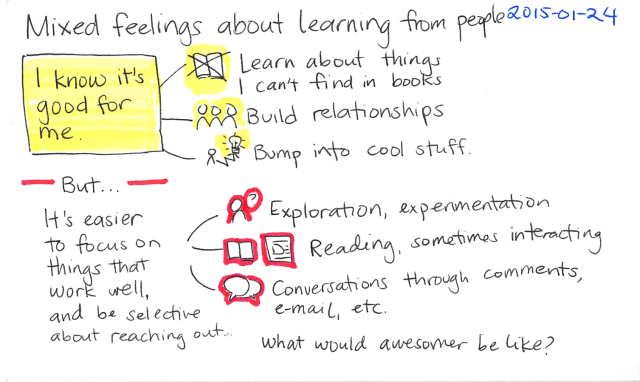
I noticed that I have a strong bias towards online conversations instead of offline ones. Sure, online conversations might be lower-bandwidth or not as nuanced. But blog posts and comments expand the conversations to include other people, and it's easier to follow up on threads of ideas. I think this preference is among the reasons why, compared to several years ago, I now spend much less time going to parties or meetups. Instead, I focus on writing and connecting online.
But I get plenty of writing time already, so maybe I should mix more offline conversations into my life. This would follow the principle that I shouldn't always do what's fun and easy. It makes sense to develop skills and routines in other areas as well. For example, I can imagine getting better at cultivating acquaintances through shared activities like cooking at Hacklab and hosting board game afternoons. I can test and refine several quick stories for small talk, which frees me up to focus on learning more about the other person through questions. It's like the way foreign language learners can boost their feeling of fluency by anticipating common questions ("Where are you from?" "What do you do?") and practising answers to those.
I think that getting better at asking questions and learning from people starts mostly from getting to know people as individuals. What makes them different? What's interesting about their lives? There's always something to find. The next step after that is to gradually build the acquaintance or the friendship through things like lunches or get-togethers. It makes sense to open my world so that I can come across good people. I enjoy their company, I grow in helping out, and I learn from the conversations with them and the mental models of them.
More thoughts
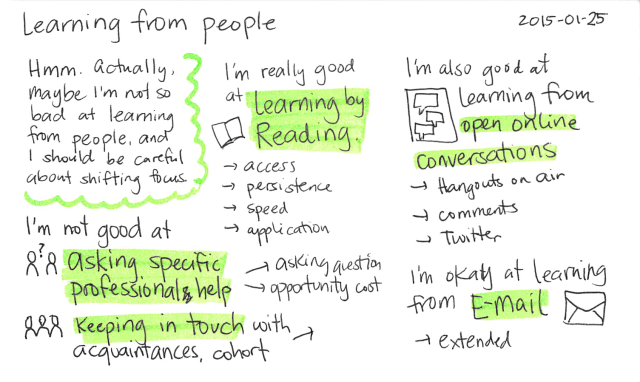
Thinking about this, I realized that I'm not bad at learning from people. I'm pretty good at learning from books, blogs, and online conversations, which is why I rely on those so much. But there are some aspects of learning from people that I can improve, and I can play around with those without cutting too much into the time I spend learning in other ways.

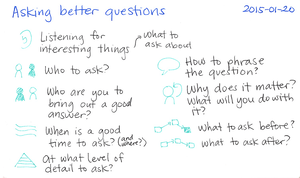
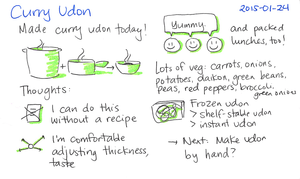
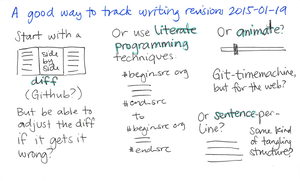
3 comments
Aaron Wolfson
2015-02-18T19:21:01ZI find I have to really practice asking people questions. I have this invisible barrier that says people will be annoyed at me if I ask them too many questions.
But that never happens. If anything, it's the opposite.
People enjoy talking about themselves and things they've learned, and they really like if something they say can help someone else (which is why following up is so important---I'm not great at that, either).
Do you have any systems in place that help you with keeping in touch?
sachac
2015-02-20T17:33:01ZIt's funny how self-conscious or hesitant we are about things that other people actually don't mind. =) I know this, and yet sometimes I feel awkward making small talk even though I know other people appreciate the effort!
I used to have elaborate systems for reminding me to keep in touch, but I've been worrying about it less these days. Folks in Toronto can drop by Hacklab.to most Tuesdays if they want to hang out, since I often cook there. For a while, I stayed mostly at home instead of going to parties, but I think I'll start going to more of them for question-practice.
I'm planning to experiment with treating least one friend out to lunch/coffee/dinner at least once a month, which forces me to invest more into connection and pleasure. =)
Online, I find it much easier to connect with people who blog, since I see their posts in my feed reader. Then it's mostly a matter of sharing links to interesting posts, commenting on things, or writing reflections based on what they've said. I also have a number of e-mail conversations that go on at a leisurely pace, but I don't really set followup reminders for those even though Boomerang for Gmail lets me do so.
I think I'm doing relatively okay in terms of following up on ideas (I manage to do so at least *some* of the time, and I write about it too!), although there's always room for improvement. In particular, I'm working on remembering to capture pointers back to the person at the moment that I make a TODO for myself (especially if I can link back to the tweet or mail message), so that when I eventually cross it off, I can refer back to the person. =) Org Mode helps.
I'm not at all good at proactively reaching out to new people or developing acquaintances, but I expect that I'll improve over time. Re-reading Business Model You (which Lynn Cook recently reminded me of), I think I'd like to focus more on retention rather than acquisition: deepening conversations rather than reaching out to more people. I figure people will come into my life for various reasons, and I'll bump into people naturally based on the questions I want to explore.
The rather indirect way I'm currently doing this is by thinking out loud and sharing what I'm working on, inviting people to share their thoughts/questions/observations, rather than reaching out to people directly and asking them questions. I'd like to get better at... distinguishing people? Getting to know them as individuals? So sometimes I'll read through a person's blog archives or search my mail/notifications to get a sense of the person instead of just seeing the tidbits in the stream. Now that I've started doing mail in Gnus again, I might look into how I can get org-contacts to help me take those notes on people. =)
What kinds of workflows do you have for getting to know people?
Aaron Wolfson
2015-02-20T20:46:18ZI tend toward retention over acquisition, also. I've reached out to people in the past when I have a specific question, or I find someone I want to work with on a project, but I've found that the best relationships have occurred naturally for the most part.
I do use Boomerang, but mostly to follow up with people after I've sent them something. I've experimented using a CRM (Insightly, and one before that) to remind me to check in with people every so often, but I haven't developed it into a habit (off the wagon on that right now).
So I'm thinking about just letting it all happen naturally. The biggest thing for me lately has just been putting myself in new situations. For example, I've been going to Lean Startup meetups, and I am doing a Startup Weekend starting in a few hours! So, go where people are and see what happens. There are worse workflows. ;)